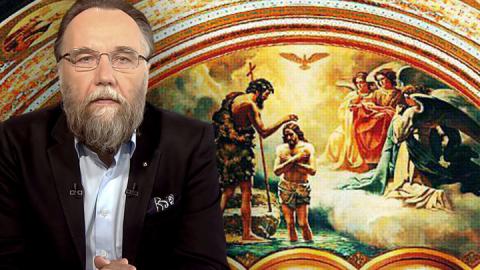With the Baptism of the Lord our time begins: the time of Christ and of us Christians
Primary tabs

At the moment of the Baptism of the Lord in the River Jordan, the Old Testament ends and the New Testament begins.
I congratulate everyone on the Epiphany of the Lord. Epiphany is a feast of great theological significance. It is wonderful that our people are reviving the Jordan tradition of Epiphany, the immersion in water. After all, on this magical night, the Spirit descends upon the waters and illuminates the elements. We are drawn to the sacred and on Epiphany we can feel Russian holiness in the brightness of experience and the joy of immersion.
On this day, Christ came to the River Jordan, where the last Old Testament prophet John the Baptist preached repentance and cleansing from sins. He knew that the Saviour, the Messiah, would soon come and invited the people to prepare for his coming by renouncing sin and turning to light, purity and truth.
Thus, they heard the voice of one crying out in the wilderness, so they were not completely deaf and had ears. Among John's followers were the future apostles. The Messiah himself, the Saviour himself, the True God and True Man Jesus Christ, came to the Jordan. John recognises him and is surprised, amazed, perplexed. Why does Christ himself come humbly, like everyone else, to be baptised?
He mysteriously said to John the Forerunner: this is how it is for us to fulfil all righteousness.
This is how it must be, this is God's plan. This is the mystery of the diminishing of the divine nature.
Christ enters the Jordan, but the Jordan is horrified. How can mere water touch its Creator? How can a creaturely element touch the sacred body of God? And the waters flow backwards. They part like the sea in the time of Moses. But for all truth to be fulfilled, baptism had to take place and, overcoming horror, the waters of the sacred river Jordan cover the Saviour. After that, the river Jordan and all the rivers of the earth will never again be the same.
When the Saviour emerges from the water after his immersion, the heavens open and the Spirit of God descends from above in the form of a shining white dove. And the voice of God the Father himself is heard from heaven: "This is my beloved Son, and I am well pleased with him".
Here, in this scene, the Old Testament ends and the Good News begins, the Holy Gospel - the New Testament, unknown to all, the philosopher points out.
John the Baptist waited for the Messiah, the Saviour, received the news of his arrival and went to meet him, away from the people, in the desert, to repent and purify himself. By repenting and purifying himself, he purified others, but he waited for the Man. The last prophet, though denounced by a higher power, waited for the King who would restore Israel. He was a Jew, the best of Jews, the highest of Jews, the most honest of prophets, but... he was still a Jew and only that, it was not a prophet or a king who came to him to be baptised in the Jordan, but God himself. And God was not archly and incomprehensibly unified - monotheistic - but Living and, moreover, Tri-hypostatic. John the Baptist immediately saw and heard all the Persons of the Holy Trinity, which no one could ever have seen. Before him, coming out of the water, stood God the Son Himself in the flesh. From the open heavens descended "in a vision of a dove" the Holy Spirit, God who comes from the Father himself, and the voice of the Father, speaking directly to John and through him to the Jews, the Hellenes and all mankind, said: "This is my beloved Son, and I am well pleased with him".
God revealed himself as he had never revealed himself before. He became man in three persons, an infinite light, clothed in holy and transfigured human flesh. This is already the New Testament. The Old Testament ends here, at this point in time and space, at the moment of the Lord's baptism in the ancient river Jordan. Our time begins, the time of Christ and of us Christians, he emphasises.
The hole in which we immerse ourselves on the night of Epiphany is called the Jordan, and the water in this hole becomes the same water in which the Saviour himself - the eternal God - was baptised. Thus, by celebrating Epiphany, we celebrate the uncreated divine Trinity, our salvation revealed and the world transformed, enlightened, purified and sanctified - its rivers, its luminaries, its earth and its winds.
Translation by Lorenzo Maria Pacini
